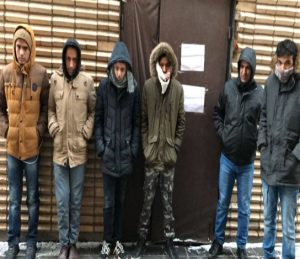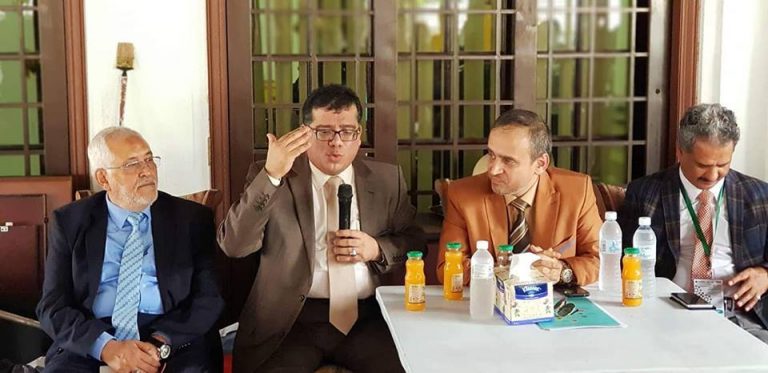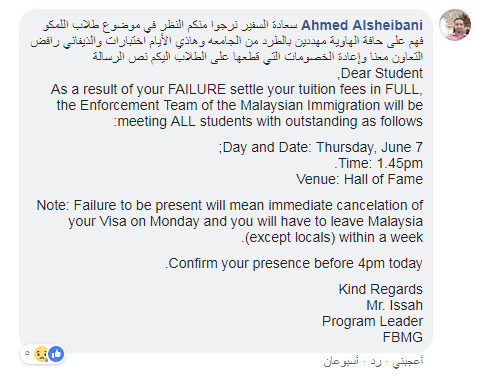Students face the risk of expulsion from universities and protests at embassies.
In the face of successive corruption across governments... there are those who suffer bitterly from the interruption of their expenses in the country of exile, and there is a group that suffers both, as he paid between 2000 and 3000 dollars to officials in the Ministry of Higher Education in order to obtain a high-end scholarship, then he was surprised after his scholarship by the falsity of the dreams that the officials in the Ministry of Higher Education promoted to him, and this is what was indicated by the investigation of the newspaper “Yemen PressIn September 2014, the investigation revealed the random distribution of scholarships, their manipulation, and their failure to be distributed according to a legal mechanism. It also revealed that the deadlines of students with outstanding grades were extended for more than five years, and that 160 male and female students with low grades below 90% were sent on scholarships; 18 of them were between 79% and 60%, according to a document issued by the Central Organization for Control and Accounting in 2013. The efforts of the Yemeni Parliament to address this phenomenon were ineffective, despite its questioning of the ministry’s leadership.
Annual expenditure on scholarships reached $100 million in 2013, then decreased to $52 million in 2017, as revealed in an investigation conducted by the Yemeni newspaper Al Mashad under the title “Forgotten Students.”
With this suffering, some Yemeni students have been forced to work abroad to earn a living. Some of them have reached such a point, as one of the Yemeni students in Malaysia tried to set himself on fire, coinciding with a warning from a Malaysian university to expel 50 Yemeni students if they did not pay their tuition fees before August 24, 2017. This incident was one of the reasons that prompted the students to protest at the Yemeni embassy building in Malaysia.


Returning to the history of protests, the first student protest was at their country's embassy in Algeria in late 2012. Yemeni embassies subsequently witnessed a wave of protests that continue to this day. It's worth noting that during one of the protests at the Yemeni embassy in Algeria, Algerian security forces were called in to disperse the students who had been holding a sit-in at the embassy.
The same applies to the Yemeni embassies in Morocco, Russia, and Tunisia, where the embassies closed their doors to students and security forces were called in to disperse the sit-in. The Tunisian sit-in, which began in February 2017, ended with the dispersal on its fourth day after Tunisian security forces pledged to engage with the Yemeni embassy to reach possible solutions.
In Russia, the situation escalated with embassy staff being prevented from entering the building and the building being closed twice, the first time on 15/12/2016 and the second time on 3/8/2017, in response to the embassy's procrastination towards them, closing its doors for four months, and using Russian security against them. The sit-in lasted for more than 10 days, ending on 27/4/2017.
In a phone call with Yemen Youth Channel, Radfan Almas, head of the Yemeni Students Association in Russia, commented on the situation, saying: “Students have been complaining about not receiving tuition fees since September 2016. Russian universities have given students until the end of April 2017, and they will be expelled if tuition fees are not paid.”

On August 3, 2017, Belqis TV reported that a sit-in took place in Poland, where students demanded that the Yemeni embassy pay all their dues.
In Morocco, Safwan Abu Hatem spoke on Yemen Youth Channel on August 17, 2017, saying: Yemeni students studying in Morocco announced the resumption of their sit-in in front of the embassy after a 70-day grace period at the embassy's request. Moroccan security forces were sent to break up the sit-in by Yemeni diplomat Ezz El-Din Al-Asbahi, who threatened them with deportation. The embassy was closed to the students and the ambassador did not respond to them. The sit-in has entered its third day.
In contrast, both the Jordanian and Malaysian embassies responded to the students' protests throughout 2017 and 2018. In Malaysia in 2018, Ambassador Bahumid sat with the students at the embassy, supporting their demands, but without any significant action other than a show of modesty in front of the students before Eid al-Fitr. An urgent advance of $300 was disbursed to a select number of more than 511 students on scholarship in Malaysia, and the Deputy Minister of Higher Education, Dr. Khalid Al-Wasabi, came on the eve of the protest to listen to their demands.
Some students commented on Ambassador Bahumid's Facebook post, demanding that tuition fees be disbursed promptly before they are expelled from the university. Ahmed Al-Shaibani, a student at Limkokwing University, commented, saying, "Your Excellency, the Ambassador, we ask that you look into the issue of the Limko students. They are on the brink of expulsion from the university. These days there are exams, and Al-Dhaifani refuses to cooperate with us and return the discounts he granted to the students."
While student Saddam Hussein Saleh, a scholarship student at UPM University in Malaysia, comments, saying: “I have been lying to my children since the beginning of Ramadan, and from day to day, and I say I have work to do, so I can avoid taking them to the clothing market to buy Eid clothes, while I had high hopes, after God Almighty, that the advance payment would reach my account. Unfortunately, the ambassador was able to offer something he could apologize for, but until now I cannot apologize to my children because they do not understand and do not know what an apology is. The problem is that I have become indebted to most of my colleagues and friends, and therefore I cannot ask for more debts, not to mention the landlord, and the nightmare of late rents, or the remaining fees for the children’s school… God have mercy on us… I am now ready to send my account number to anyone privately so that they can deposit money in it… Happy Eid, Your Excellency the Ambassador… I will not disturb you and I will not hold a sit-in at the embassy so as not to distract you from your work… My sincere regards.”


In Jordan, Foreign Minister Dr. Al-Mikhlafi's visit and diplomats' meetings with students were an attempt to quell the anger, but to no avail.
But you'll find the situation is completely different at the Yemeni embassy in Egypt. The cultural attaché's office has been transformed into a reception hall during Ramadan for all the protesters, where they eat and shout, but no one listens.

Yemeni scholarship students receive special support...regularity, comfort, and excellence.
Contrary to the stereotype of students under government severance, there is another group of students who enjoy comfort, excellence, and regularity in their studies. These are students receiving scholarships supported by NGOs and foreign governments.
As for civil society organizations, the most famous are: Aoun Foundation for Development, andHadhramout Foundation for Human Development, andCharitable Fund Foundation for Supporting Outstanding Students, All three of these institutions were established by Saudi businessmen of Hadrami origin, who made Hadramout (eastern Yemen) the starting point for their activities in sending students abroad.
The common ground between these three institutions is their mutual cooperation, and that they are based on a regulatory mechanism that begins from the moment a student applies for a scholarship, and ends with their graduation from university. This mechanism is based on the principle of motivation and warning, and there is no leniency in implementing the system, despite the fact that the number of universities and countries that support it is small, as it supports scholarships in (Saudi Arabia - Jordan - Turkey - Philippines - Egypt - Canada - America - France - Malaysia - India) and 20 other countries on an intermittent basis.
The number of students sent through the Charitable Fund between 2008 and 2015 (before the war) in Saudi Arabia, Malaysia, and Jordan reached 1,287 students, distributed across more than 20 universities, while 1,022 students were distributed across 21 other countries since the foundation's inception in 1990 until 2015.
Scholarships sent abroad by these three organizations largely came to a halt with the outbreak of the war in Yemen in 2015. This was primarily to countries such as Saudi Arabia and the United States, while other countries continued to receive scholarships, such as France, Malaysia, Jordan, Turkey, and the Philippines.
they Saudi businessmen of Hadrami origin, founders of the Hadramout Foundation for Human Development as follows:
Sheikh Engineer Abdullah Ahmed Bugshan
Chairman of the Board of Founders
Members:
Sheikh Abdullah Salem Bahamdan - Sheikh Abdul-Ilah Salem bin Mahfouz
Sheikh Mohammed Hussein Al-Amoudi - Sheikh Hassan Mohammed bin Laden
Sheikh Salem Ahmed Basmah - Sheikh Omar Saleh Babiker
Sheikh Abdul Qader Saeed Al Amoudi - Sheikh Salem bin Ahmed Balhamer
These scholarships are based on a comparison of students through specific tests to select the best candidates, followed by personal interviews for those who pass the first stage. The selection process also involves assessing the students' English language proficiency, followed by a selection process. This is not the case with Yemeni government scholarships, which rely solely on secondary school certificates for comparison.
There are also regional offices for the institutions. The Charitable Fund Foundation has offices in the Kingdom of Saudi Arabia, and the Aoun Foundation for Development has a regional office in Malaysia.
These three institutions have reaped the fruits of this organization and commitment from their students in the form of patents, competition awards, and peer-reviewed research.
However, statistics from the Charitable Fund Foundation (2015-2016) show that there are a small number of people who withdrew from the scholarships offered to them, whether by transferring from the university to which they were sent, or by permanently dropping out of education. Their number is 38 male and female students out of 1,307 male and female students, and the number of distinguished students in the first places reaches 436 male and female students.
This leaves no doubt that private institutions maintain their academic reputation by not having struggling students in their ranks.


As for the support of foreign governments that provide scholarships under their sponsorship, the average number of Yemeni students sent to study abroad in one country reaches one hundred per year for the bachelor’s degree. The most prominent supporters are (Saudi Arabia - Turkey - Malaysia - Russia - Slovakia - Czech Republic - Germany - France - China - Britain - Indonesia - Brunei - South Korea - Netherlands - Hungary - Bulgaria - Qatar).
These governments offer scholarships to Yemeni students directly through their embassies, and selection is based on the same criteria outlined for private institutions.

Among the private scholarships offered to Yemen are those provided by Total Oil Company, which provides annual scholarships prior to 2015, with an average of 20 scholarships annually, split equally between undergraduate and graduate degrees. However, some are awarded to those with influence and power in the oil-producing areas where the company operates, as reported by more than one reliable source.

The final type of support is the U.S. State Department's support for scholarships through AMIDEAST, the international education and training organization, which has been in operation since 1952. AMIDEAST has supported approximately four thousand students in the United States. It also provides other scholarships to American universities in Beirut and Cairo.
The same criteria mentioned above are used, especially the English language, as the scholarship requires a TOEFL certificate.
There are scholarships offered to Yemenis through external organizations that do not have offices in Yemen, but students can apply for them electronically, and this is a separate topic for discussion.
Although some countries have closed their scholarships due to the ongoing war in Yemen, others are still providing them, due to the availability of air and land travel routes from Yemen via (Sultanate of Oman - Sudan - Djibouti - Egypt - Jordan) to the scholarship countries.
It's striking that all of these institutions and governments rely on the stories of their scholarship students in their annual reports to project their academic reputation to communities and nations. The Ministry of Higher Education, in contrast, has not capitalized on the presence of more than 9,000 students abroad to convey their success stories and strengthen its governmental reputation. Instead, it has earned a negative reputation that has only grown worse with each passing month.
